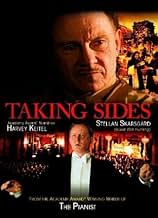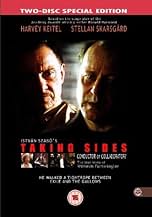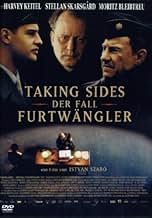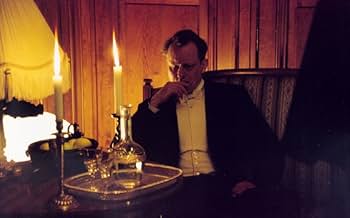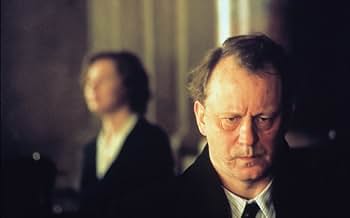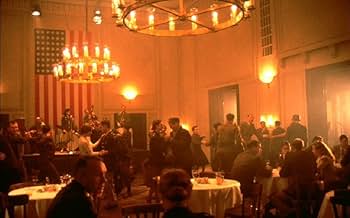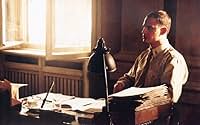Taking Sides
- 2001
- Tous publics
- 1h 48m
After the end of World War II, a famous German conductor is accused of loyalty to the Nazi regime. He argues that art and politics are separate. An investigator thinks otherwise.After the end of World War II, a famous German conductor is accused of loyalty to the Nazi regime. He argues that art and politics are separate. An investigator thinks otherwise.After the end of World War II, a famous German conductor is accused of loyalty to the Nazi regime. He argues that art and politics are separate. An investigator thinks otherwise.
- Awards
- 9 wins & 3 nominations total
Featured reviews
I personally thought the play was great and the film even better. The reason being that the film was able to portray scenes of Post-war Nuremburg and some vivid concentration camp scenes. (not for the weak of heart) to make its point. Nevertheless as in the stage production, the most vivid scenes still took place in the office of Captain Arnold between him and Dr. Furtwangler. The film roles being played by Harvey Keitel and Stellan Skarsgård. Was the relationship cruel to a point of excess by Capt. Arnold? How true were Dr. Furtwangler's version of life during the Nazi regime. ---??? I wish I could give an answer even to myself--Therefore, no spoiler is possible.
The film raises disturbing questions about the relationship of arts and politics.
As a conclusion, since this was a film with two intensely powerful actors, I would hope to see one or both up for a well deserved Oscar award.
For example: there are frequent references in the dialogue to Furtwängler's rival, Herbert von Karajan ("Little K.") Why did the Americans attack Furtwängler, and not von Karajan, who was an ardent Nazi? Furtwängler was prevented from conducting in the U.S., while von Karajan was lionized. Perhaps the makers of this film thought that the implications of this were too big to be discussed in the film. I'm sure that they didn't even want to go near the fact that the people who ran the de-nazification program were Americans with close ties to the Nazis themselves.
Also, Furtwängler's rationale for staying in Germany was somewhat more philosophical than the film implies. He thought he was defending the legacy of Mozart, Beethoven et al against the Nazis, and that this was a sacred responsibility. A bit of this comes out in the film, but in a superficial way.
With respect to the success of the film otherwise, Stellan Skarsgaard is excellent as Furtwängler, even managing to resemble him somewhat. I think that Harvey Keitel is somewhat hampered by the script -- the film would have been more successful if Keitel had come off as more conflicted and less one-dimensional. Clearly the director wished to imply that Keitel was conflicted, but that, as a military man, he was required to toe the line -- the frequent shots of Army indoctrination films (about how bad the Germans were) were intended to provide a rationale for Keitel's behavior. But the film would have been more compelling if Keitel were given an opportunity to express more doubts about what he was being asked to do. I also thought that the ending was a bit anticlimactic.
This is actually one of the central themes of the work of director Istvan Szabo. In 'Mephisto' and 'Hanusses' he was also dealing with the Nazi era, but by telling WWII stories the Hungarian director does nevertheless talk also about all dictatorships, or specifically the Communist rule he knew directly.
The action of the film happens after the war, when Wilhelm Furtwängler, one of the greatest directors of the century stands on trial in a denazification tribunal for his cooperation with the Nazi regime. Despite many of the great musicians of the era he did not live Germany, he played for the Nazi dignitaries in Jews-free orchestras, and his opposition to the Nazi regime is unclear. He was not a Nazi party member, and he intervened to save lives of Jewish musicians, but yet was used a propaganda tool until the very end of the war.
The balance of the movie lies in the balance of the superb acts of the two principal actors. Harvey Keitel plays the American prosecutor major Arnold, while Wilhelm Furtwängler is played by the Sweidish Stellan Skarsgård. Arnold is the opposite of Furtwängler in almost any plane. To his moral superiority enhanced (maybe not necessarily) by filmed reports from the death camps is opposed Furtwängler's ambiguity and doubts, but his rudimentary culture is no match for the European refinement of the director. Keitel gives a strong act, maybe a too strong one, as his rudeness opposed to the doubts and maybe remorse of the German seem to give to the musician a postume and probably not deserved absolution.
The last scene shows Furtwängler living the building where the interrogation happened in the sounds of Beethoven's Fifth. The director switches to a real filmed concert with the same music, at the end of which Furtwängler shares hands with a Nazi dignitary (may have been Goebels, the Nazi minister of propaganda). The he is shown (twice, once in close plan) wiping his hand as in some kind of cleaning act. The question remains if a handkerchief is enough to clean somebody who shook hands with the Devil.
What I'd like to note is that this is a film of a dying breed. It is truly educational and stimulates our systematically dumbed down intellect ( as also Szabo's older film "Mephisto" ). It's when reading the comments of other viewers that one realizes that there are still people out there that can appreciate film as a vehicle of dialectic and whose insightful observations add to our collective learning experience. Thank you.. it is SUCH a pleasure to read your comments.
dvoulio
Did you know
- TriviaTo the criticism of both movie critics and American audiences of depicting the American Denazification officer Maj. Steve Arnolds (Harvey Keitel) as a "caricature, a bully, a Philistine," screenplay writer Ronald Harwood told The Jewish Journal that he went on to comb archives for denazification transcripts and to interview officials who had supervised such proceedings."They were morally brutal," Hardwood stated. "They bullied people, and they did behave in an extreme way. But they had just seen the camps, and no one in the world had seen that before."
- GoofsWhen Major Arnold is listening to the recording of Beethoven's Fifth Symphony, the record finishes the first movement and carries straight on to the second. Long playing albums, which ran at 33 1/3 rpm, were introduced in 1948, but the record shown is a 78 rpm one. The performance of the 5th Symphony would have been on a set of five 78 rpm records, one movement each, split over the two sides. It should not be possible for the second movement to start without the record being changed.
- Quotes
Emmi Straube: When he made his decision, he couldn't have known everything. Especially not the way people like you do, who've returned from exile and feel that you have a right to pass judgement. Because you are blameless, you think you know best who is a sinner and who deserves forgiveness. But you have no idea how people lived here.
- ConnectionsEdited into Taking Sides Again (2004)
- How long is Taking Sides?Powered by Alexa
Details
- Release date
- Countries of origin
- Languages
- Also known as
- Taking sides - Le cas Furtwängler
- Filming locations
- Production companies
- See more company credits at IMDbPro
Box office
- Budget
- $20,000,000 (estimated)
- Gross US & Canada
- $188,952
- Opening weekend US & Canada
- $22,051
- Sep 7, 2003
- Gross worldwide
- $422,832
- Runtime1 hour 48 minutes
- Color
- Sound mix
- Aspect ratio
- 1.85 : 1
Contribute to this page


